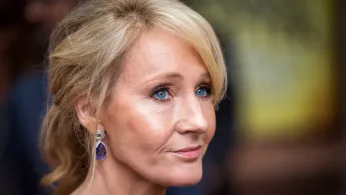
7 hours ago
JK Rowling’s Anti-Trans Comments: A Timeline of Controversy and Community Response
READ TIME: 4 MIN.
JK Rowling, author of the Harry Potter series, commands one of the most visible public platforms in contemporary literature. Her comments on transgender issues first drew widespread attention in March 2018, when she "liked" a tweet referring to trans women as "men in dresses." Rowling’s spokesperson later claimed this was a mistake, but the incident sparked early accusations of transphobia and led to significant online debate. Many LGBTQ+ advocates highlighted the harm such statements could have, particularly given Rowling’s global influence and large fan base .
In December 2019, Rowling publicly supported Maya Forstater, who lost her job at the Center for Global Development due to her gender-critical views. This was seen as Rowling aligning herself with a movement that opposes legal recognition of transgender identities. The tweet stated, "Dress however you please... But force women out of their jobs for stating that sex is real?" This drew immediate condemnation from LGBTQ+ organizations, including GLAAD, which accused Rowling of "willfully distorting facts about gender identity and people who are trans" .
June 2020 marked a turning point in Rowling’s public discourse on trans issues. On June 6, Rowling criticized a Devex article for using "people who menstruate" instead of "women," tweeting: "If sex isn’t real, there’s no same-sex attraction. If sex isn’t real, the lived reality of women globally is erased." Critics argued that such statements invalidated transgender identities and conflated biological sex with gender, a stance condemned by medical and LGBTQ+ organizations .
On June 10, Rowling published a 3,600-word essay on her website, listing "five reasons for being worried about the new trans activism." She expressed concern about the "explosion in young women wishing to transition," referenced her experiences as a survivor of domestic abuse, and argued against expanding access to single-sex spaces for trans women. Rowling also suggested that transitioning could be "driven by homophobia" and compared medical transition for trans youth to "conversion therapy for young gay people." Many LGBTQ+ and medical experts refuted these claims, noting that scientific evidence shows detransitioning is rare and that affirming care improves mental health outcomes for transgender youth .
The essay and tweets were rapidly condemned by actors from the Harry Potter franchise. Daniel Radcliffe, writing for The Trevor Project, stated, "Transgender women are women. Any statement to the contrary erases the identity and dignity of transgender people and goes against all advice given by professional health care associations who have far more expertise on this subject matter than either Jo or I" . Emma Watson and Eddie Redmayne also publicly affirmed support for transgender people, echoing that "trans women are women, trans men are men, and non-binary identities are valid" .
Following the June 2020 essay, Rowling continued to make statements on social media, equating trans-related medical care with mental health interventions and expressing concern about the future of women’s rights. She stated, "I respect every trans person’s right to live any way that feels authentic and comfortable to them. I’d march with you if you were discriminated against on the basis of being trans. At the same time, my life has been shaped by being female. I do not believe it’s hateful to say so" .
LGBTQ+ organizations and fans responded by distancing themselves from Rowling’s work. Major Harry Potter fan sites issued statements supporting transgender people and rejecting Rowling’s views. GLAAD and other advocacy groups emphasized that "trans rights are human rights" and called out Rowling’s statements as harmful and disproven .
The controversy also provoked broader discussion about separating art from the artist. Many lifelong fans reported feeling alienated, and some chose to stop supporting Harry Potter-related products to avoid contributing royalties to Rowling. The conversation expanded to critique issues of representation in Rowling’s work, highlighting the need for more inclusive storytelling .
Rowling has maintained her position, rejecting the label of "transphobic" and framing herself as a defender of women’s rights. She has cited personal experiences and concerns over gender recognition laws, especially in the UK, as reasons for her stance. The debate remains polarized, with Rowling’s statements continuing to be cited in discussions about free speech, cancel culture, and the rights of transgender people .
Meanwhile, the LGBTQ+ community and allies continue to advocate for trans rights and visibility. Organizations such as The Trevor Project and GLAAD provide resources and support for transgender youth, emphasizing the importance of affirming care and challenging misinformation. The ongoing response to Rowling’s comments has highlighted both the vulnerability and resilience of transgender people in public discourse.
Rowling’s comments have had tangible effects. For many transgender people and allies, her statements have been deeply disappointing, undermining efforts toward greater acceptance and inclusion. Medical professionals and advocacy organizations have reaffirmed that supporting transgender identities is essential to health and wellbeing. The backlash has also galvanized support for trans rights, with celebrities, fan communities, and advocacy groups speaking out to affirm the dignity of transgender people .
The ongoing controversy serves as a reminder of the responsibility that comes with public influence. As debates around gender, identity, and inclusion continue, the visibility of trans voices and experiences remains vital. Rowling’s legacy is now intertwined not only with the magical world of Harry Potter, but also with the movement for transgender rights and the global conversation about respect, dignity, and equality.






